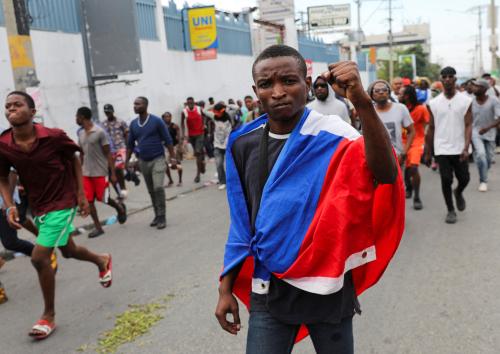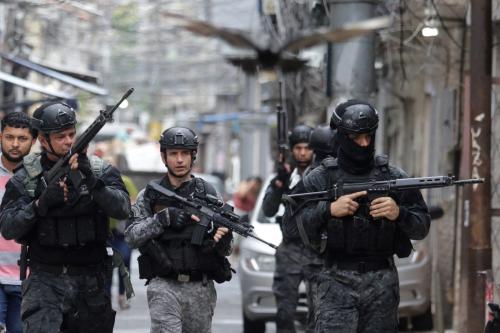On December 2, the Latin America Initiative (LAI) and the Center for 21st Century Security and Intelligence (21CSI) at Brookings hosted Colombian Minister of National Defense Juan Carlos Pinzón Bueno for a discussion of Colombia’s security accomplishments, current challenges, and future needs. Here are some highlights of Minister Pinzón’s remarks.
On U.S. military aid and Plan Colombia: In 2000, when Plan Colombia started, U.S. funding as a percentage of total defense sector funding reached almost 20 percent of the Colombian defense budget. It is below 1 percent now, he said. According to Pinzón, “this shows first the will of the Colombian people to pay our own bills, particularly to recover our nation, to recover our security.” And also: “Certainly appreciating what we get from the U.S., that still we need to get, but showing that these only go to quality capabilities … exceptional in technology and knowledge that can really give a certain push.”
On poverty: What we care about most these days … is everything related to equality, everything related to reducing poverty, and every social indicator we can measure.” Pinzón stated that “Just five years ago we had a poverty rate of around 52 percent and extreme poverty was around 40 percent.” In comparison, Pinzón pointed out that “we have about 9 percent unemployment right now” after more than a decade in double digits.
On the war on drugs: In Colombia, said Pinzón, “fighting drugs was critical to end the ‘gasoline’ that all types of criminal groups had … for us it was not a choice.”
Pinzón explained how much marijuana and cocaine the Colombian government is seizing: “we are seizing above 600 tons of cocaine, and around a similar number on marijuana.” He pointed out the decrease in drug production: “For the first time last year we became the second coca producer in the world. Not any more the first … we had that unfortunate honor for several years.”
Pinzón stated that the military faced more troubles with cartels and other illegal groups because of the geography of Colombia and ungoverned spaces. “When you don’t have control, someone else will fill that absence.” He said that now, “We are putting pressure in their own bases at the same time for the first time ever.”
On citizens’ perceptions: Pinzón was proud of the effect that his campaign has had on the Colombian people. According to him, “Around 90 percent of Colombians … when they talk about security problems they are not talking anymore about the country falling to [an] illegal organization or to a terrorist organization.” Similarly, Pinzón stated that “According to the latest polls, the institution that is appreciated even above the church and the government [is] the armed forces.”
On the future:
After technically defeating those enemies, those enemies of the Colombian people … what we’re telling [them] is, maybe it’s time for you to get out of this situation … We will continue to pressure every day, everywhere, as hard as we can, so they understand that they only have one exit with dignity … trying to agree for an option of peace and getting into the political system which in the end is part of what our democracy conceives. … There are challenges … but I think we are moving forward with strength, with decision, and we will keep moving the bar as far as we can so these people [criminals] understand that the Colombian people do not want this type of violence anymore. … My frank opinion is that Colombia will reach peace.
Listen to the full audio recording:
LAI Director and Senior Fellow Harold Trinkunas provided introductory remarks. Senior Fellow Michael O’Hanlon of 21CSI then interviewed Minister Pinzón.
Colleen Lineweaver contributed to this post.



Commentary
Juan Carlos Pinzón Bueno: Colombia Will Reach Peace
December 3, 2013